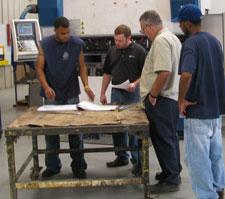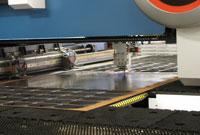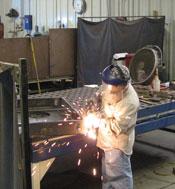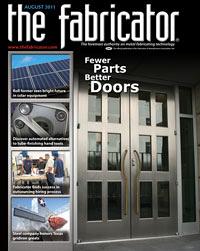Senior Editor
- FMA
- The Fabricator
- FABTECH
- Canadian Metalworking
Categories
- Additive Manufacturing
- Aluminum Welding
- Arc Welding
- Assembly and Joining
- Automation and Robotics
- Bending and Forming
- Consumables
- Cutting and Weld Prep
- Electric Vehicles
- En Español
- Finishing
- Hydroforming
- Laser Cutting
- Laser Welding
- Machining
- Manufacturing Software
- Materials Handling
- Metals/Materials
- Oxyfuel Cutting
- Plasma Cutting
- Power Tools
- Punching and Other Holemaking
- Roll Forming
- Safety
- Sawing
- Shearing
- Shop Management
- Testing and Measuring
- Tube and Pipe Fabrication
- Tube and Pipe Production
- Waterjet Cutting
Industry Directory
Webcasts
Podcasts
FAB 40
Advertise
Subscribe
Account Login
Search
Fabricator finds path to skilled labor
Fabricator finds success outsourcing the hiring process
- By Tim Heston
- August 1, 2011
- Article
- Shop Management

Mike Evans, Jason Wasdin, David Moore, and Sam Evans consult part data to ensure everyone is on the same page for the day’s work.
Crow Corp. has been hiring. In fact, managers had been attempting to add people not long after business started picking up last year. Like others in metal fabrication, the company struggled to find the right person with the right skills. Some new hires would work for a few weeks and then not show up. Others had plenty of talent and showed up to work, but they just weren't a good fit for the organization.
Keith Jennings set out to change matters. He helped lead the shop through the recession and became company president after his stepfather retired in October 2009. Growing up in Houston, Jennings watched Crow (the name comes from the initials of the company’s four founders) transform itself from a traditional tool and die and stamping operation into a high-tech metal fabricator. The fabricator bought its first CNC machines in the early 1980s, starting with punch presses, then with plasma/ punch combination machines, waterjets, and press brakes. By the time Jennings joined the family firm in 1992, the company was deeply into the CNC. In the late 1990s came lasers and a growing machining division to support the bread-and-butter sheet metal work. All these machines—from punching and stamping to laser cutting and machining—produced parts for various sectors, including aerospace, medical, construction, and the one Houston is known for: the oil and gas industry.
Jennings’ stepfather never shied away from technology. “My dad has always been a shop and equipment guy,” he said. “When he saw an opportunity, and it involved buying new equipment, he gave it a shot.”
Overall, managers considered adopting the latest technology as critical to success. New equipment alone doesn’t guarantee success, though, especially when operators come and go. Such high turnover just wasn’t acceptable, so in 2010 Jennings took a different approach to the hiring process. He outsourced it.
Why Outsource Hiring?
Some may think outsourcing such a critical aspect to the business would only add fuel to the fire, but Jennings had a different perspective. In 2009 Crow, like so many fab shops, was taking on any job that came in the door, including one-off orders from individuals.
“Someone who may have found us on the Internet would give us a call and say, ‘Can you make this part for my motorcycle?’, and other goofy things like that,” Jennings said. “We knew we were never going to have repeat work for this, but we took it because we needed the work.”
Such work required people to read prints, fit up jobs, tweak setups; in other words, it required skilled craftspeople—not people here one day and gone the next. The shop pays well above market average, especially for highly skilled jobs like welding, but Jennings admitted some of Crow’s wages aren’t the highest in town. Lucrative temp jobs abound in the Houston area. A plant or refinery shuts down and hires welders and other fabricators to perform repair and maintenance work. The work pays very well, but it’s grueling and, most important, temporary. Crow pays well, Jennings said, but it can’t afford to beat every wage in town. Besides, the fabricator offers what those temporary jobs don’t: stability and good benefits.
Worth the Price
Crow now outsources the hiring process to a firm called V.I.P Staffing. Jennings admitted that outsourcing to a technical hiring firm doesn’t come without significant upfront costs. People found through the staffing agency are initially brought on temporarily for several weeks before Crow managers decide whether to hire the new person permanently. During that time Crow pays a certain percentage above the new worker’s wages to V.I.P. Staffing.
But the benefits far outweigh the costs, Jennings said, and these benefits include convenience. V.I.P. screens candidates, verifying they have legal citizenship or immigration status (especially important in the Houston area). V.I.P. takes care of the reference-checking and the initial interview. If the new worker doesn’t pan out, Crow simply doesn’t hire the worker on permanently. Throughout it all, the staffing agency handles the paperwork.
“Reading” Candidates
Edwin Trevino, Crow’s principal recruiter at V.I.P., maintains a wide network of skilled tradespeople in Houston. He knows the work environment at various Houston manufacturers. Some are great, some aren’t so great. Some pay extremely well but aren’t the best workplaces. Some offer very good wages—though perhaps not the highest in town—as well as good work environments and benefits. Crow Corp., he said, fits into this last category.

A punch/laser combination machine cuts a nest of parts. Crow Corp. has done laser cutting since 1997.
“If I get a candidate and the first thing out of his mouth is about how much the job pays, there’s a problem,” Trevino said. “The pay is usually already stated in the ads. If he still asks me about pay, that’s a sure-fire sign he’s not going to stick around. He’s going to leave for a little more money.”
Houston’s fabrication industry has plenty of jobs suited for this kind of talent, including those highly paid, temporary shutdown jobs. Trevino doesn’t look down on these workers. The industry needs them, often direly. But if a candidate thrives on temporary work, he may not be the best fit for a job shop manager wanting low turnover.
Trevino plays matchmaker for Houston-area fabricators. He has visited Crow, knows the culture, and “reads” candidates during the interview to see if they would suit the company. Sometimes Jennings gets a call from Trevino about a potential candidate, then several days later Trevino may call again to say he’s not sending that candidate after all. A second interview or perhaps a background check may have revealed something that would have made the candidate a bad fit. Such candidates never visit Crow, nor do they even know Crow is hiring or, for that matter, even exists.
“Previously these people would have come in here, and we probably would have wasted a bunch of time,” Jennings said.
Not every candidate sent Jennings’ way fits the bill, but many of them do. And thanks to increased skill, each employee is producing more. For instance, the company employs fewer welders than it did years ago, but each produces more, and they make more money because of it.
The Art of Hiring
It may seem counterintuitive to outsource hiring, such a critical part of any business, but as sources explained, hiring is an art. According to Trevino, identifying people who have the necessary skills isn’t difficult. The skills are concrete and measurable. A part is fabricated within tolerance or it isn’t. But evaluating the soft skills—personality, character, work ethic—isn’t easy.
The law prohibits employers from asking plenty of discriminatory questions. Sure, a troubled home life may affect work performance, but then again, it may not, which is why such topics are off limits during the hiring process. This is why, Trevino said, much of hiring boils down to not only asking the right questions, but also listening very intently.
“Past work history can tell you only so much,” Trevino said, adding that the rest of the hiring process builds on it. Put another way, the resume and references (which, if provided by the applicant, are almost always positive) are only the book’s cover. The rest of the hiring process—networking, interviewing, and so on—fills in the pages.
As a recruiter, Trevino said he gets a “feel” of an engaged worker, one who uses his mind as much as his hands, one who would take ownership and get the job done with little hand-holding. That feel is worth a lot to Crow Corp.
Jennings said his 50-employee company will need such talent over the next three to five years as it expands its marketing efforts to broaden its customer base. Although its sales have since rebounded, Crow’s revenues plummeted by 40 percent during the recession, and Jennings is working to prevent a repeat performance. He added that only the right people—those who are engaged and take ownership over what they do—will make it happen.

A worker wire-welds a component at Crow Corp. Today the company employs several welders found through V.I.P. Staffing. In fact, the company employs fewer welders than it did several years ago, but the welding department produces about the same level of output. In other words, each welder is more productive.
The Supermarket Effect
Edwin Trevino, a Houston-based recruiter at V.I.P. Staffing, has been an industrial technology student and an electrician in the Navy, and he speaks English and Spanish, vital for an industrial recruiter in Houston. He isn’t a welder. He hasn’t run a press brake, punch press, or laser cutting machine. But he has managed people in a sector that has greatly affected how modern manufacturers operate: the grocery business. For 15 years he worked at a grocery chain, starting at the bottom—a checkout bagger—and working his way up the ladder to various managerial positions.
“I had to recognize who was a team player and who wasn’t,” Trevino said. “I had to be able to sit down with people and recognize who would go above and beyond, and who wouldn’t.”
Decades ago Toyota managers observed just-in-time delivery operations at U.S. grocery stores, which stocked just enough to meet demand. It’s where the supermarket pull system of lean manufacturing comes from. Workers can’t operate in a vacuum. At the grocery store and manufacturer, it’s about getting the right item to the right place at the right time. An inefficient, incompetent, or absent worker in one area affects those in other areas. Whether this involves a batch of welded brackets or a bushel of apples, the basic thinking is the same.
About the Author

Tim Heston
2135 Point Blvd
Elgin, IL 60123
815-381-1314
Tim Heston, The Fabricator's senior editor, has covered the metal fabrication industry since 1998, starting his career at the American Welding Society's Welding Journal. Since then he has covered the full range of metal fabrication processes, from stamping, bending, and cutting to grinding and polishing. He joined The Fabricator's staff in October 2007.
subscribe now

The Fabricator is North America's leading magazine for the metal forming and fabricating industry. The magazine delivers the news, technical articles, and case histories that enable fabricators to do their jobs more efficiently. The Fabricator has served the industry since 1970.
start your free subscription- Stay connected from anywhere

Easily access valuable industry resources now with full access to the digital edition of The Fabricator.

Easily access valuable industry resources now with full access to the digital edition of The Welder.

Easily access valuable industry resources now with full access to the digital edition of The Tube and Pipe Journal.
- Podcasting
- Podcast:
- The Fabricator Podcast
- Published:
- 04/16/2024
- Running Time:
- 63:29
In this episode of The Fabricator Podcast, Caleb Chamberlain, co-founder and CEO of OSH Cut, discusses his company’s...
- Trending Articles
How to set a press brake backgauge manually

Capturing, recording equipment inspection data for FMEA

Tips for creating sheet metal tubes with perforations

Are two heads better than one in fiber laser cutting?

Hypertherm Associates implements Rapyuta Robotics AMRs in warehouse

- Industry Events
16th Annual Safety Conference
- April 30 - May 1, 2024
- Elgin,
Pipe and Tube Conference
- May 21 - 22, 2024
- Omaha, NE
World-Class Roll Forming Workshop
- June 5 - 6, 2024
- Louisville, KY
Advanced Laser Application Workshop
- June 25 - 27, 2024
- Novi, MI


























